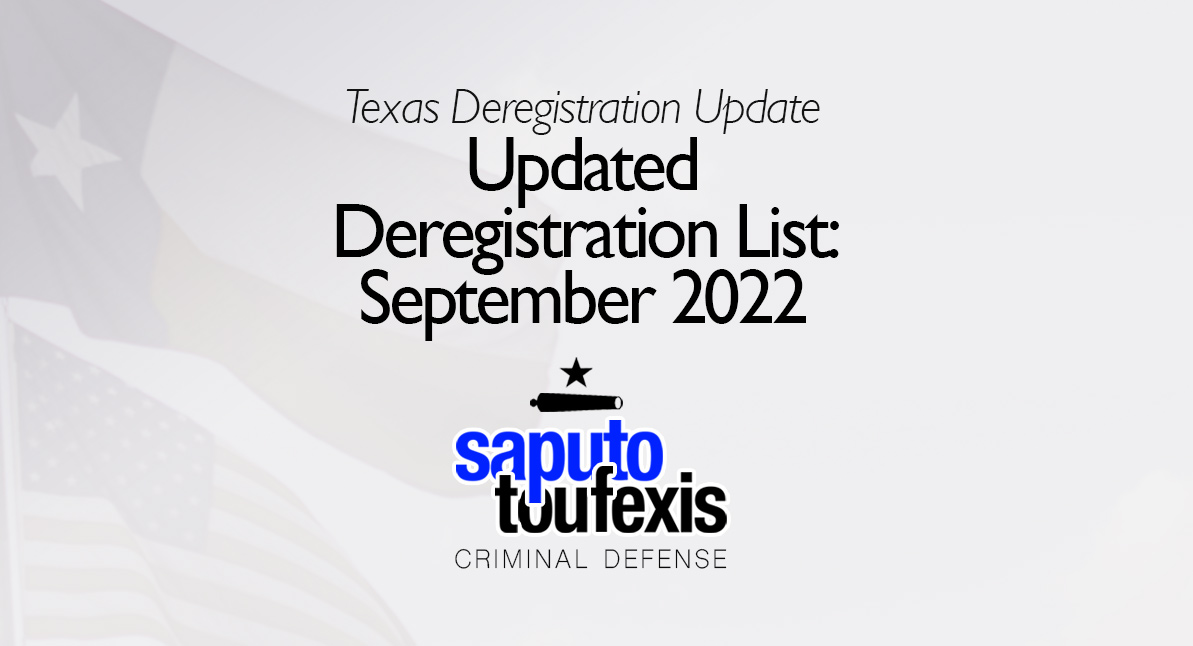In September 2022, DPS published an updated list of offenses that are eligible for sex offender deregistration. DPS has published updated lists several times since the deregistration law was passed, and this is the latest version. This article explains some of the key updates in this September 2022 list.
2022 Deregistration Update FAQs
- Where can I find the September 2022 list of offenses eligibile for deregistration under Texas law?
- What were the major changes made in the September 2022 list?
- What offenses are most impacted by this new list?
- What still needs to be fixed?
- How do I know if I’m eligible to deregister under the new list?
Texas law requires DPS to maintain a list of all offenses that require sex offender registration for a longer period under Texas law than the minimum required registration period under federal law. The offenses that are categorically prohibited from deregistration are those offenses that require lifetime registration under federal law and offenses that require a longer period of registration under federal law than what is required under Texas law.
The list that DPS publishes is therefore a critical step in determining a person’s eligiblity to deregister. The list that DPS published in September 2022 expanded some key areas of eligibility – especially with respect to attempted offenses, Online Solicitation of a Minor, Prostitution, Indecency with a Child by Exposure, and Bestiality. Unfortunately, this list is extremely confusing. We’re going to break it down below. In the meantime, if you were charged with Online Solicitation of a Minor, Prostitution, Indecency with a Child by Exposure, or Bestiality, please review this article and schedule an appointment with us because you may now be eligible for deregistration in Texas.
Where can I find the September 2022 list of offenses eligibile for deregistration under Texas law?
You can find the list here. DPS is required to publish their tiered offense lists,[1] which they have been doing on their website, but we archive them for reference.
What were the major changes made in the September 2022 list?
DPS essentially added two new categories to their list of eligible offenses. These are for offenses where Texas law required a “post-10” registration (meaning sex offender registration is required for 10 years after discharge from parole or probation) and the offender was required to register for 5 years while on deferred/probation/parole or 15 years while on deferred/probation/parole.
If you have a post-10 offense, and it’s a Tier I offense under SORNA, you would be eligible to deregister if you were required to register for at least 5 years while you were on probation or parole. These include the Texas offenses of Unlawful Restraint, Bestiality, Indecency with a Child by Exposure, and several “attempted” offenses like Attempted Trafficking of Adults or Attempted Possession of Child Pornography.
If you have a post-10 offense, and it’s a Tier II offense under SORNA, you would be eligible to deregister if you were required to register for at least 15 years while you were on probation or parole. These include the Texas offenses of Online Solicitation of a Minor, Prostitution with a person younger than 18, and several attempted offenses like Attempted Continuous Sexual Abuse of Young Child or Children and Attempted Sexual Performance by a Child.
Before this newest update, many of these offenses were not not listed as eligible offenses, so if you have been denied deregistration before, you may now be eligible.
What offenses are most impacted by this new list?
The Texas offenses of Unlawful Restraint, Bestiality, Indecency with a Child by Exposure,Online Solicitation of a Minor, and Prostitution with a person younger than 18 are probably the most impacted because those offenses did not have any path to deregistration eligiblity before this newest update. The same could be said for several of the “attempted/solicitation/conspiracy” offenses like Attempted Trafficking of Adults or Attempted Possession of Child Pornography.
If you have an attempted offense, make sure you check the list because it could be affected.
Check the section above to see how these offenses were affected by the changes in September 2022.
What still needs to be fixed?
There are still some unresolved issues on this newest list. For instance, the 2017 list expressly allowed deregistration for a narrow category of sexual assault convictions – those involving 16 year olds and 17 year olds where there was no violence or force, it was a consensual contact, and it was illegal merely because of the age of the victim – but this exception was inexplicably removed from all later lists.
There were other categories of eligiblity that were removed as well. Because the list was reformatted at the time all of these categories were removed, it’s unclear whether they were removed intentionally or left off merely in an attempt to make the list more clear.
How do I know if I’m eligible to deregister under the new list?
You’ll definitely want to review our eligibility section on the main Texas sex offender deregistration page, but some of the key requirements for eligiblity have not changed, including only one reportable conviction,[2] and it must be a Texas state court conviction.
Legal References:
^1. Texas Code of Criminal Procedure Section Article 62.402(b)
^2. Texas Code of Criminal Procedure Section Article 62.403(b)









